Everly Brothers

-
Inducted2001
-
Band Members:
- Isaac Donald Everly
- Philip Everly
Isaac Donald Everly
Born February 1, 1937
Died August 21, 2021
Birthplace Brownie, Kentucky
Philip Everly
Born January 19, 1939
Died January 3, 2014
Birthplace Chicago, Illinois
From Nashville to Rock & Roll Stardom
In purely commercial terms, the Everly Brothers were one of the most successful acts in popular music between 1957 and 1962. Only Elvis Presley, Pat Boone, and possibly Rick Nelson outsold them. In a sense, though, Don and Phil Everly were more important to Nashville: the first consistently successful rock & roll act to come from Music City.
As the first commercially successful rock & roll act to come from Nashville, the Everly Brothers extended Nashville’s sense of what was commercially possible. But their roots and much of their sound was embedded in country music. In artistic terms, the Everly Brothers took the country brother duet a step beyond their predecessors. They added Bo Diddley riffs, teenage anxieties, and sharkskin suits, but—for all that—the core of their sound remained country brother harmony. That link was underscored on their 1958 album of traditional folk and country compositions, Songs Our Daddy Taught Us.
The Everlys’ father, Ike, was an accomplished fingerstyle guitarist, a contemporary of Merle Travis, who went to Chicago trying to sustain a career in country radio and ended up in the Midwest. He brought his family to Nashville in 1955, possibly hoping that his boys could find the success that had eluded him. Don found some success as a songwriter (“Thou Shalt Not Steal” for Kitty Wells, two songs for Justin Tubb, and another for Anita Carter), but a contract with Columbia Records’ Nashville division in 1955 yielded just one undistinguished single.
By the time the brothers signed with Cadence Records in March 1957 (a deal midwifed by music publisher Wesley Rose of Acuff-Rose), they were singing teenage playlets crafted by songwriters Boudleaux and Felice Bryant overlaid with R&B rhythm patterns. The Everlys scored a string of hits, including “Bye, Bye Love,” “Wake Up, Little Susie,” “All I Have to Do Is Dream,” “Bird Dog,” and others. They became Grand Ole Opry members on June 1, 1957.
Songs
00:00 / 00:00
00:00 / 00:00
00:00 / 00:00
Moving to Warner Bros. Records
When the Everly Brothers switched to Warner Bros. Records in 1960, they were, at first, even more successful. “Cathy’s Clown,” “Ebony Eyes,” “Walk Right Back,” and “So Sad (to Watch Good Love Go Bad)” were among their hits. Their records were among the most immaculately crafted and innovative of the era, a testimony to the brothers’ musical vision and to the skill of the Nashville session players who proved themselves adept at executing more than they were often given credit for.
The responsibility for the downward slide in the Everlys’ career is usually laid at the door of the Beatles, but the brothers’ appeal was beginning to wane a year or more before the Beatles appeared. They broke with Wesley Rose in 1961, moved to California, and began making singles that were probably too experimental for the time. A slowdown in their touring schedule brought on by a joint enlistment in the Marines, the loss of access to the Bryants’ songs owing to the split with Acuff-Rose, and Don’s subsequent overreliance upon prescription drugs probably figured in their decline, too.
Videos
“Wake Up, Little Susie”
The Perry Como Show, 1957
“When Will I Be Loved”
HBO special filmed live at Royal Albert Hall, 1983
Image Gallery
-
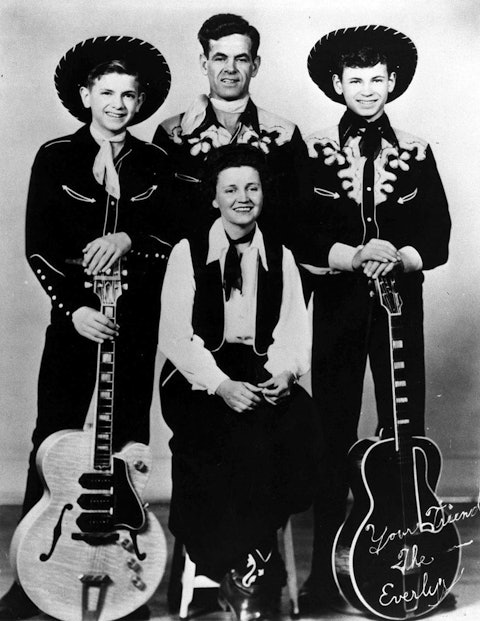
The Everly Brothers with their parents. Standing, from left: Phil, Ike, and Don Everly. Seated: Margaret Everly.
-
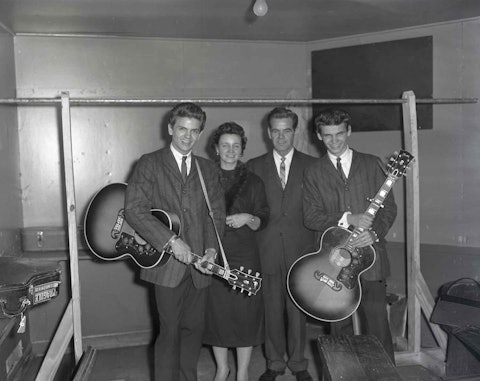
The Everly Brothers all grown up with their parents, late 1950s. From left: Phil, Margaret, Ike, and Don. Photo by Elmer Williams.
-
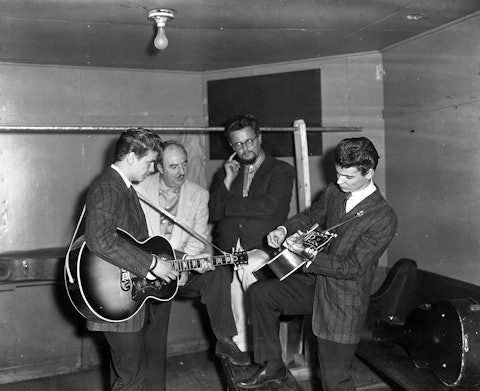
The Everly Brothers with two key men in their career (from left): Phil Everly, Everlys manager Wesley Rose, songwriter Boudleaux Bryant, and Don Everly. Photo by Elmer Williams.
-
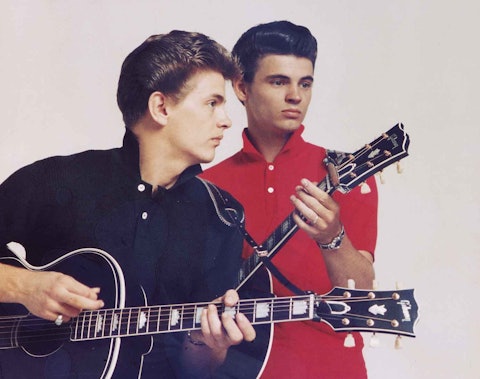
Phil Everly (left) and Don Everly in an early 1960s publicity photo.
-
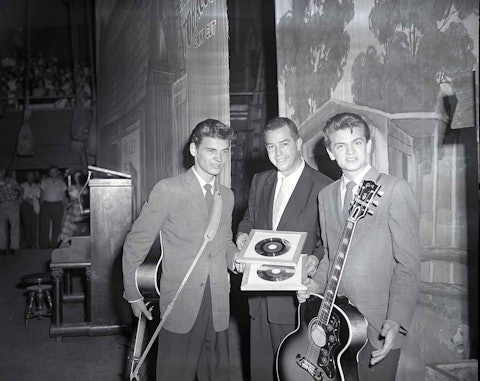
The Everly Brothers with Grand Ole Opry manager “D” Kilpatrick at the Opry, late 1950s. They became members of the Opry on June 1, 1957. Photo by Elmer Williams.
-
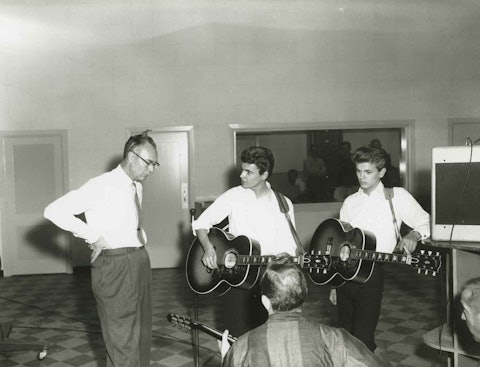
The Everly Brothers with their record label head and producer Archie Bleyer during a recording session at RCA Studio B, 1957. Photo by Elmer Williams.
-
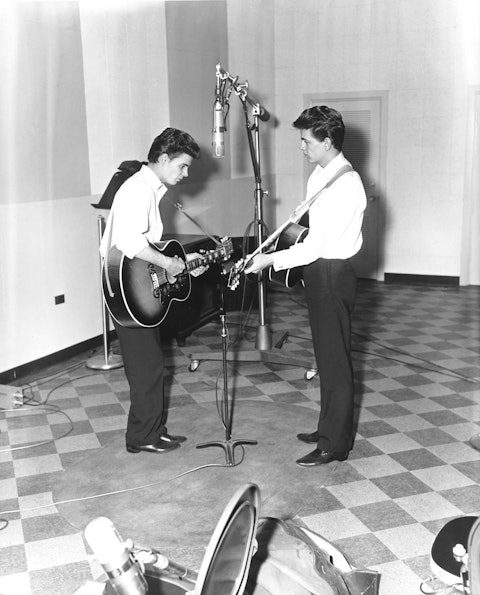
The Everly Brothers recording at RCA Studio B in 1957.
Breakup and Reconciliation
In 1968, the Everly Brothers issued Roots, a daring country-rock record that failed to find them a new market. In 1970 they switched to RCA, but they split angrily from each other in July 1973. Don returned to Nashville; Phil stayed in Los Angeles.
The Everlys reunited in September 1983 for a live concert album released on Mercury Records and resumed performing and recording together. In their later touring years, the brothers donated concert proceeds to the philanthropic Everly Brothers Foundation.
Members of the Rock and Roll Hall of Fame and recipients of a Grammy Lifetime Achievement Award, the Everlys were elected to the Country Music Hall of Fame in 2001. Phil Everly died on January 3, 2014, of complications from chronic obstructive pulmonary disease.
— Colin Escott
Adapted from the Country Music Hall of Fame® and Museum’s Encyclopedia of Country Music, published by Oxford University Press
The Everly Brothers’ records were among the most immaculately crafted and innovative of the era, a testimony to the brothers’ musical vision and to the skill of the Nashville session players.



